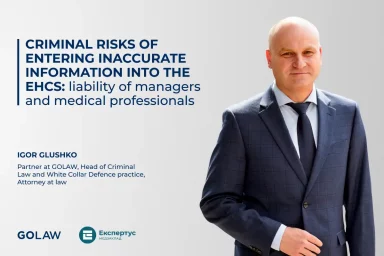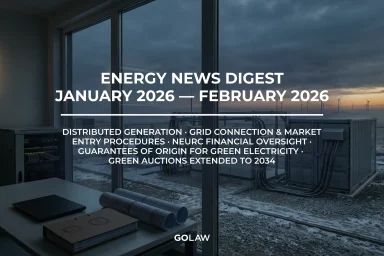New Era of Investments: why is time for concessions?
Contents
A concession is a form of public-private partnership (PPP) that enables investors to engage in long-term projects with reduced risks while supporting the development of a country’s infrastructure.
It is a key mechanism for attracting private investment in public infrastructure, facilitating effective collaboration between the state and businesses in crucial economic sectors such as energy (including electricity generation and distribution, and alternative energy sources like solar and wind power), transportation (covering ports and airports, roads and railways, urban transit, and metro systems), and utilities (such as water supply and sewerage, waste management, and maintenance of social infrastructure). This approach fosters mutually beneficial partnerships that advance national development.
Why choose a concession, and who benefits from it?
The concession mechanism in Ukraine offers benefits to the state, private investors, and society as a whole. For the state, the primary advantage is the ability to attract private investment for infrastructure development without heavily burdening the national budget—a crucial factor given limited resources and current economic conditions. This approach enables the modernisation of roads, bridges, hospitals, and other essential facilities without incurring direct expenses. Moreover, private investors introduce new technologies and efficient management methods, improving facilities’ quality and contributing to economic activity growth.
Private investors benefit from concessions by gaining long-term access to strategic public facilities, allowing them to plan their investments over an extended period. They gain entry into key sectors such as transportation, energy, and utilities, which are typically restricted from private investment. Investors also enjoy autonomy, managing all stages of the project, optimising costs, and securing a stable revenue stream from the users of the services provided.
In essence, concessions are particularly attractive for private investors seeking to enter the public sector. Moreover, these projects serve as a reputational investment, as they enhance community living standards by improving services like transportation, energy, and water supply. They also create new jobs, stimulate the local economy, and boost employment.
What experience do we have?
Some of the most successful concession projects in Ukraine include the concession of Kherson Port, valued at UAH 300 million, which was transferred to the Risoil-Kherson company, and Olvia Port, valued at UAH 3.4 billion, which was concessioned to a subsidiary of Qatar-based QTerminals Group. These successes can be attributed, in part, to the new Law of Ukraine “On Concessions,” which came into effect in 2019. The law introduced several significant reforms, such as conducting tenders through an electronic platform, establishing clear criteria for bid evaluation, and providing state support tools and guarantees for investors.
As of January 1, 2024, 10 out of 22 Public-Private Partnership (PPP) agreements implemented in Ukraine—more than 45%—are concession agreements. Additionally, despite ongoing war, preparations are underway to concession the property of the railway and ferry complex of the Sea Commercial Port Chornomorsk State Enterprise.
What is new to come?
Draft Law No. 7508 (“Draft Law”) proposes to maintain two types of Public-Private Partnership (PPP) agreements: concession agreements and PPP agreements. This approach aligns with practices in many other countries, which distinguish between “user-pays” and “government-pays” PPP agreements.
The Draft Law also introduces amendments to the Law of Ukraine “On Concessions,” including:
- Introduction of the definition of “donor”: a “donor” may include the European Union, a foreign state, a foreign government or its authorised bodies or organisations, a foreign municipal body, or an international organisation providing technical assistance, as well as other legal entities offering grants for PPP projects. This expansion enables private partners to secure additional funding sources for concessions.
- Clear distinction of concession agreement terms: the term of a concession agreement will be defined as the period from the date of signing to the date of transferring the concession object to the concessionaire. The concession term will then commence from the date of property transfer. This clarification reduces legal uncertainties, helping private partners mitigate risks related to obligations on assets not yet transferred.
- Reduced timeframe for concession preparation: the time allocated for preparing for a concession tender and signing the concession agreement will be reduced from six to three months following the adoption of a resolution on concession expediency. This accelerated process minimises the risk of delays and expedites project completion for private partners.
- The list of essential conditions in concession agreements will be extended and include the procedure for the agreement to enter into force and the requirements for reimbursing expenses incurred during proposal preparation and advisor engagement. This enhances transparency and simplifies the organisational and financial aspects for private partners.
- Introduction of additional forms of state support: 1) providing state and local guarantees; 2) making payments in favour of concessionaire to compensate difference between minimum guaranteed level and actual level of demand for goods (works, services); 3) co-financing through a grant for private partner’s expenditures associated with construction (new construction, reconstruction, restoration, refurbishment, technical re-equipment) of facility. These measures help reduce financial risks, ensure stable income, and lower initial project costs for private partners.
- Freedom to choose applicable law: parties may freely select the governing law for their legal relations arising from civil law agreements based on the concession agreement, including financing and direct agreements.
- Introduction of arbitration clauses: the Draft Law permits the inclusion of an arbitration clause in concession agreements if the private partner is a company with foreign investments. This provides more legal and financial flexibility, expedites dispute resolution, and enhances the appeal of concessions to foreign investors.
Overall, the proposed amendments are highly attractive to investors, as they simplify the process of entering into concession agreements, reduce financial risks, and protect private partners’ interests. We believe that adopting the new law is essential and will be a significant step toward advancing concession projects and rebuilding Ukraine’s infrastructure.
If you need legal advice, please fill out the form below to request it.

Oleksandr Melnyk
Partner, Head of Corporate Law and M&A practice, Attorney at law
- Contacts
- 31/33 Kniaziv Ostrozkykh St, Zorianyi Business Center, Kyiv, Ukraine, 01010
- o.melnyk@golaw.ua
- +38 044 581 1220
- Recognitions
- Lexology Index: Client Choice 2026
- The Legal 500 2025
- IFLR1000 2025 (International Financial Law Review)
- Legal 500 Green Guide 2024
- 50 Leading Law Firms Ukraine 2026
Get in touch
To get a consultation, please fill out the form below or call us right away:Sign up to be aware
New achievements are inspired by information. GO further, don’t miss out GOLAW news and legal alerts
Our expertise
-
- Energy and Natural Resources
- Antitrust and Competition
- Banking and Finance
- Compliance, Corporate Governance and Risk Management
- Corporate and M&A
- Criminal and White Collar Defence
- Defense in Anti-corruption procedures and regulations
- Digital Economy Practice
- Labor and Employment
- Natural Resources and Environment
- Government Relations (GR)
- Insolvency and Corporate Recovery
- Intellectual property
- International trade
- Legal support of business and private Сlients in Germany
- Litigation and dispute resolution
- Private clients
- Real Estate and Construction
- Restructuring, Claims and Recoveries
- Martial Law
- Tax and Customs
-
- Agribusiness
- Aviation
- Chemical industry
- Engineering, Construction and Building Materials
- Environment and Natural Resources
- Financial institutions
- IT and AI
- Industry and manufacturing
- Healthcare industries, Life sciences and Pharmaceuticals
- Media, Entertainment, Sports and Gambling
- Retail, FMCG and E-Commerce
- Transport and Logistics
We use cookies to improve performance of our website and your user experience.
Cookies policy
Cookies settings







